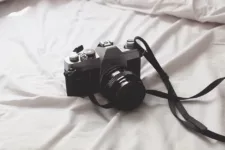I’ve been a professional travel photographer for a couple of years now and I can say without a doubt that it wasn’t easy doing so. Countless hours spent studying photographic textbooks and the works of other photographers have made me the successful person that I am today.
That isn’t to say I did everything right or even efficiently along the way either. Honestly, I wish that someone had been there to drop some wisdom on me, like how to choose a good camera for traveling or which tutorials to pay attention to. In order that you may avoid the pitfalls that I, unfortunately, had to navigate (the hard way), here are five pieces of advice that would’ve made my life as easier upon starting my photographic journey.
#1 Don’t Worry About How “Powerful” Your Camera Is
Megapixels. Dynamic Range. Low light performance. None of these things matter if you don’t know how to take a good picture first. While a lot of the aforementioned features do improve your photos, they don’t make the photo. As has always been the case with photography, the key to taking a good photo is by following the pillars of proper photography, which are inspiration, composition, reading the light, and proper exposure.
I can’t tell you how many times when I first got started with photography that I would stress about how capable a camera was. I would stay up all night long, obsessing over tests, graphs, numbers, you name it. I would dream about how awesome it would be to have something like the latest Canon 5D or the top-of-the-line Sony A7, and never were those fantasies made real.
Eventually, I settled upon an older Fujifilm X-T1 and ended up falling in love with it. I realized then that a camera is only as good as the photographer using it. Instead of worrying about the tech, I began to train myself to become the best photographer possible.

#2 Find a Mentor
Photography is like any other artistic subject: you have to study, study, study in order to improve. First thing I did was invest a pile of photographic textbooks ranging from Bryan Peterson’s Understanding Exposure to Fil Hunter’s Light, Science & Magic. I quickly learned the basics and felt competent enough to move onto more complex subjects like HDR, creative dodging and burning, and luminosity masks. At that point, I began to invest in premium tutorials and processing videos.
The problem with these medians is that they give no direction or feedback. I had learned how to properly use several techniques but I still had little idea of when to use them. It’s in this situation that an actual mentor really pays off. With someone experienced, who can give you insight and guide you in ways that a book can not, you’ll be able to develop more naturally as a photographer.

#3 You’re Going to Take a Lot of Bad Photos
For every 100 images that you take, maybe 1 one of them will be worthy in your eyes. Whether because they are improperly exposed, copies, or just plain terrible, be prepared to sort through a lot of junk. Taking hundreds of photos is all a part of the process though.
Sometimes, a photo can just get screwed up. You may think that the focus is nailed in one photo only to realize later that it’s blurry. Or maybe you thought that that sunrise would look better with a brighter exposure only to realize that it’s actually washed out. This is a good reason to take multiple captures.
In addition, there are always little nuances and details in every photo that you may have consciously missed. Maybe you’re shooting a seascape – you pay most of your attention to the waves, the rocks, the sky and are completely oblivious to everything else. After firing off a seemingly exorbitant amount of shots, you go back and review your photos only to realize you missed several things. Maybe those seagulls or that girl playing in the water add extra narrative. Good thing you kept shooting, right?

#4 You’re Often Going to be Creatively Frustrated
Mark my words: you’re going to feel very uninspired and more times than you’d care for. It will seem like you can’t find one good image in a million. If you’re the passionate type, you may beat your head against a wall. You could get sick of the frustration and put your camera down for an extended period of time. These things happen though.
Photography, like any creative process, is something that ought to spring from internal inspiration. To take a photograph for any other reason would be unjust. If you’re not feeling inspired, don’t force the process – it’ll return naturally.
Switch things up and try a different photographic style or technique. You may find that it is the perfect spark for your imagination. If you’re a landscape photographer, try shooting portraits. Next thing you know, you’re pressing the shutter button like crazy and uttering oohs and aahs at your new work. Welcome back.

#5 You’re Going to Start Seeing Things in a Whole Different Light
Since studying photography, I can’t help but look at my surroundings in photographic terms. I perceive my environment according to the rule of thirds. I look out the window of a car and notice how the passing landscape is more or less illuminated. I’m stuck in this everchanging composition that I’ve created for myself.
Seeing the world through a photographer’s eye is not a bad thing though. In fact, I feel as if I have a newfound appreciation for the reality that I inhabit. Details that I once overlooked are now grand and unignorable. Colors are even more wonderful and have greater significance to me as if my previous self had possessed the visual capacity of a canine.
There’s not a day that goes by that I’m not grateful to photography for giving me what it has. My eyes feel more receptive than ever and my relationship with the world is more harmonious than ever. I still wish someone had told me to stop reading those fucking camera reviews though and to just go take pictures!









